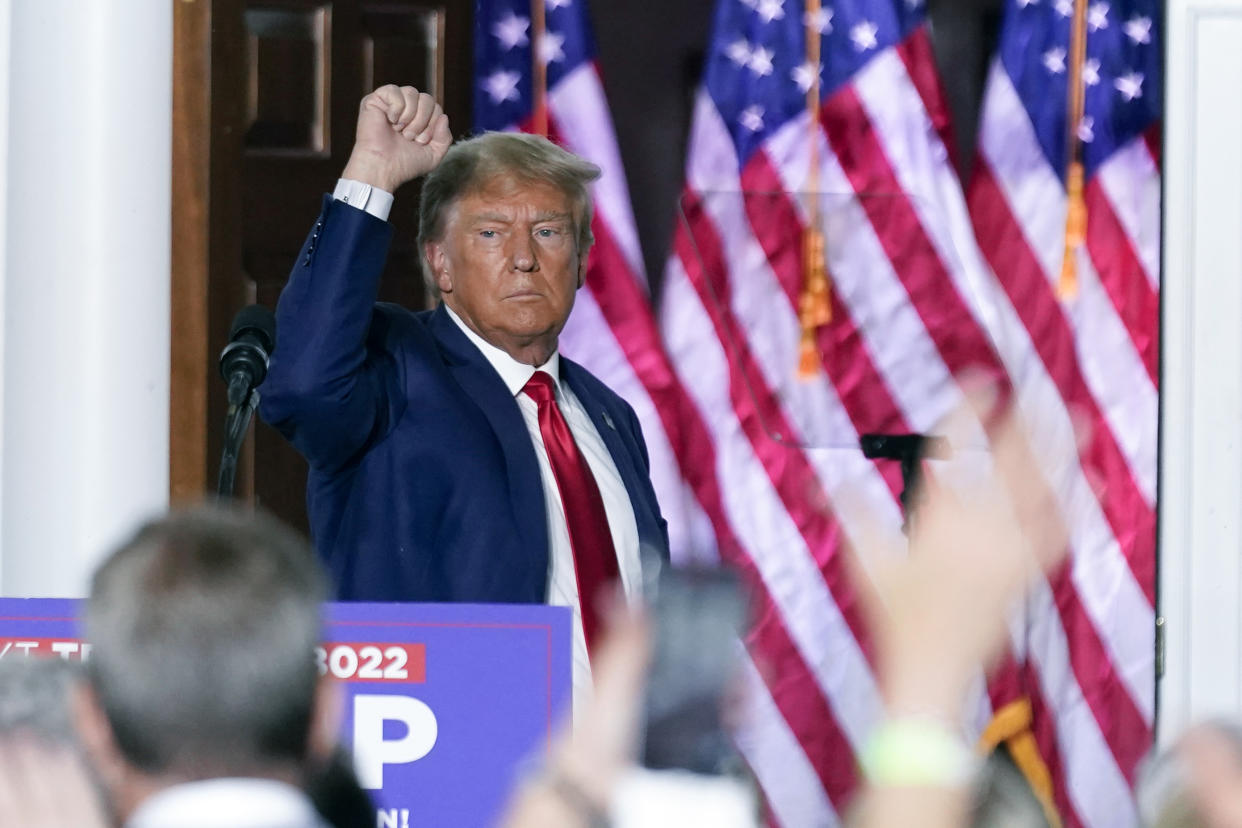FACT FOCUS: Trump twists Presidential Records Act, Clinton ‘sock drawer’ case to mount defense

- Oops!Something went wrong.Please try again later.
- Oops!Something went wrong.Please try again later.
To hear former President Donald Trump tell it, taking and withholding classified documents was perfectly consistent with federal law and a decade-old legal case involving former President Bill Clinton.
“Under the Presidential Records Act — which is civil, not criminal — I had every right to have these documents,” Trump claimed in a speech Tuesday night, hours after he pleaded not guilty to dozens of felony counts accusing him of hoarding classified documents and refusing government demands to give them back. “The crucial legal precedent is laid out in the most important case ever on this subject, known as the Clinton socks case.”
But legal experts say Trump's description of the law — which isn’t mentioned in the charges against him — is wrong and contrary to its very purpose, while the 2012 legal case involving Clinton isn’t a sound comparison to Trump’s current legal predicament.
Here are the facts.
CLAIM: The Presidential Records Act gives a president the right to take any record when leaving office and declare them personal.
THE FACTS: That’s a flagrant misreading of the law, legal experts say.
The law, which took effect in 1981, requires the preservation of White House documents as property of the U.S. government.
Jason R. Baron, a former director of litigation at the National Archives and Records Administration, said that the notion that a president could declare any record as personal goes against the “very reason” the law was created. NARA is the federal record-keeper and the agency that repeatedly sought the documents kept by Trump.
Congress passed the act in 1978 in the aftermath of the Watergate scandal, when a collection of secret tapes that President Richard Nixon had considered destroying played a defining role.
The law, he and other experts note, clearly distinguishes between “presidential records” and “personal records.”
“The definition of ‘personal records’ is narrow, clear, and functional: it includes only records of a ‘purely private or nonpublic character’,” Peter Margulies, a professor at Roger Williams University’s School of Law in Bristol, Rhode Island, wrote in an email. “Any record that touches on information relevant to presidential decisions on foreign policy or national security is a presidential record. Period, end of story.”
Josh Chafetz, a professor at Georgetown Law, agreed, saying there’s “simply no way” the records described in the indictment against Trump could be considered “personal” under the act’s definitions.
Among the documents found at Mar-a-Lago were ones marked “SECRET” or “TOP SECRET.” The documents included details about the country’s nuclear weapons and the nuclear capabilities and military activities of other countries. Prosecutors allege, for example, that Trump showed off a classified map of a foreign country while discussing a military operation.
“There is no way to read that statutory language as giving the president ‘discretion’ to categorize military plans, to take just one example, as ‘personal’,” Chafetz wrote in an email.
___
CLAIM: A case involving Bill Clinton keeping audio tapes in a sock drawer proves that Trump’s actions were legally sound.
THE FACTS: The case in question involved very different documents and experts say it isn’t the parallel Trump makes it out to be.
In Judicial Watch vs. NARA, a conservative activist group sued for access to audio recordings of wide ranging interviews Clinton did with historian Taylor Branch during his time in the White House. Clinton was reported to have stashed the cassettes in his sock drawer.
The Washington, D.C. based organization had argued the audiotapes were “presidential records” that the agency should provide under the federal public records law, but U.S. District Court Judge Amy Berman Jackson ultimately dismissed the case, ruling NARA didn’t have the authority to seize the records from Clinton and hand them over.
David Super, another professor at Georgetown Law, argues the 2012 Clinton case has “absolutely nothing to do with” the charges Trump currently faces.
For one thing, the court didn’t dismiss the case because it found that Clinton was entitled to keep the tapes, Super said. Jackson simply ruled that NARA could not turn over the tapes as public records because they were owned by the historian and not government property.
Trump’s 2024 presidential campaign didn’t respond to an email seeking comment, but the Republican and his allies have argued that the judge’s ruling in the case showed that the Presidential Records Act affords presidents complete discretion to delineate between personal and presidential records.
Legal experts this week also dismissed those arguments. Margulies, of Roger Williams University, said the claim “mixes apples and oranges.”
“The Clinton materials were audiotapes of conversations with an historian that incidentally recorded some calls on official business,” he wrote. “In contrast, the documents that Trump kept were all presidential records from the moment they arrived at the Oval Office from other parts of the government.”
Eric Freedman, a professor at Hofstra University's School of Law in Hempstead, New York, also noted that a federal appeals court has already rejected similar arguments raised by Trump’s legal team as it sought to block the criminal investigation into the records found at Mar-a-Lago.
In either case, Super said, any discussion about the Presidential Records Act is “largely a red herring” because Trump doesn’t face charges of violating that law.
The indictment instead charges Trump with Espionage Act violations, as prosecutors argue the documents he kept could harm the country if obtained by adversaries.
___
This is part of AP’s effort to address widely shared misinformation, including work with outside companies and organizations to add factual context to misleading content that is circulating online. Learn more about fact-checking at AP.

